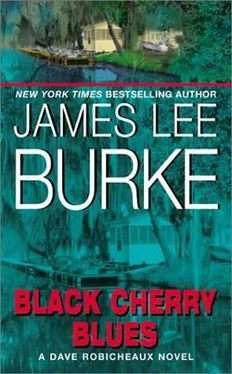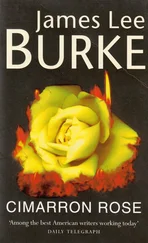The gambler had his car door open to let in the breeze. He was thin and wore sideburns and brown zoot pants with suspenders and a striped shirt and a green necktie with purple dots on it. A brown fedora sat in the back window.
He asked me in French if the dog was mine. When I didn't answer, he said, "You don't talk French, boy?"
"Yes, sir."
"That your dog?"
"Yes, sir."
"You know how to make him stop running them chicken? Break a stick on him. You ain't got to do it but once."
I walked away in the dust toward the house and the trees, and I didn't look at my dog. I heard my father say to my mother, "In five minutes I'm coming there. That little gun won't do him no good, neither."
She took me by the hand and walked me quickly to the front steps and sat me in her lap. She brushed my face and hair with her hands and kissed me and patted my thighs. There were drops of perspiration behind her neck, and I could smell her perfume, like four-o'clocks, and the powder on her breasts.
"You been good at school, huh?" she said.
"You been going to mass, too, you? You been making confess and go to communion? Aldous been taking you? You got to do good in school. The brothers gonna teach you lots of t'ings."
"Why you stay with him?"
She pressed my face against her breasts. I could feel the hard shape of her stomach and her thighs.
"He shot somebody. In a card game," I said.
"He ain't bad. He's good to me. We brung you a present. You gonna see."
She picked me up and carried me to the road. I could see my father watching from the side yard, the hammer in his hand. She set me down by the open door of the coupe. The air was humid and hot in the sun, and the cattails in the ditch were coated with dust.
"Come see," she said.
"Show it him, Mack. Behind the seat."
His face had no expression. He reached behind the seat, his eyes looking out at the yellow road, and pulled out a paper bag. It was folded across the top and tied with string.
"Here," she said, and unwrapped it for me. Her dress was tight across her thighs and there were dimples in her knees. The man got out of the car and walked out on the road and lit a cigarette. He didn't look in my father's direction, but they could see each other well.
"You like a top, huh?" my mother said.
"See, it got a crank. You push it up and down and it spin around and whistle."
There was perspiration in her black hair. She put the top in my hands. The metal felt hot against my palms.
"Is he coming out?" the man said.
"No. He promised."
"The last time was for free. You told him that?"
"He don't want no more trouble, Mack. He ain't gonna bother us."
"I give a damn, me."
"Don't be talking that way. We gotta go. Don't be looking over there. You hear me, Mack?"
"They gonna keep him in jail next time."
"We going right now. Get in the car. I gotta be at work. Dave don't need be standing out in the hot road. Ain't that right, Davy? Mack, you promised."
He flipped his cigarette away in the ditch and got behind the steering wheel. He wore two-tone brown and white shoes, and he wiped the dust off the shine with a rag from under the seat. I saw my father toss his hammer up on the workbench, then pick up the chicken coop and look at the angles of its side.
My mother leaned over me and pressed me against her body. Her voice was low, as though the two of us were under a glass bell.
"I ain't bad, Davy," she said.
"If somebody tell you that, it ain't true. I'll come see you again. We'll go somewheres together, just us two. Eat fried chicken, maybe. You gonna see, you."
But a long time would pass before I would see her again. The Victory gardens, the picket-fenced donation centers of worn tires and bundled coat hangers, the small tasseled silk flags with blue and gold service stars that hung in house windows to signify the number of family members who were in uniform or killed in action, would all disappear within the year, an era would end, and the oil companies would arrive from Texas. I would hear that my mother worked in the back of a laundry with colored women in Baton Rouge, that Mack died of tuberculosis, that she married a man who operated carnival rides. Then when I was sixteen years old and I went for the first time to the Boundary Club on the Breaux Bridge highway, a rough, ramshackle roadhouse where they fought with knives and bottles in the shale parking lot, I saw her drawing draft beer behind the bar. Her body was thicker now, her hair blacker than it should have been, and she wore a black skirt that showed a thick scar above one knee. She brought a beer tray to a table full of oil-field workers, then sat down with them. They all knew her and lit her cigarettes, and when she danced with one of them she pressed her stomach against his loins. I stood by the jukebox and waved at her, and she smiled back at me over the man's shoulder, but there was no recognition in her face…
I waited out in the car for my friends to come out of the club. I saw a drunk man pushed out the side door onto the shale. I saw some teenagers throw a Coke bottle at a car full of Negroes. I saw a man in a yellow cowboy shirt and tight blue jeans without a belt slap a woman against the side of a car. He hit her hard and made her cry and shoved her in the backseat and made her stay there by herself while he went back inside. It was hot and still in the parking lot, except for the sounds of the woman. The willow trees were motionless on the banks of the Vermilion River, and the moonlight looked like oil on the water's surface. Dust drifted through the car window, and I could smell the stench of dead garfish out on the mud bank and hear the woman weeping quietly in the dark.
The opinion of certain people has always been important to me. Most of those people have been nuns, priests, Catholic brothers, and teachers. When I was a child the good ones among them told me I was all right. Some in that group were inept and unhappy with themselves and were cruel and enjoyed inculcating guilt in children. But the good ones told me that I was all right. As an adult, I still believe that we become the reflection we see in the eyes of others, so it's important that someone tell us we're all right. That may seem childish, but only to those who have paid no dues and hence have no. question mark about who they are, because their own experience or lack of it has never required them to define themselves. You can meet some of these at university cocktail par ties; or sometimes they are journalists who fear and envy power and celebrity but who love to live in its ambience. There is always a sneer buried inside their laughter. They have never heard a shot fired in anger, done time, walked through a mortared ville, seen a nineteen-year-old door gunner go ape shit in a free-fire zone. They sleep without dreaming. They yawn at the disquietude of those whom they can't understand. No one will ever need to tell them that they are all right.
I think for some the soul has the same protean shape as fire, or a collection of burning sticks that melts and hisses through the snow until only an ill-defined and soot-streaked hollow remains to indicate the nature of flame and its passage through ice.
Then somebody tells you that you are all right.
I had to go back on the other side of the Divide. It was a good time to take Alafair out of Missoula, too. I walked down to the school and found Tess Regan in her office. A vase of mock orange sat on her desk, and her cork board was a litter of thumbtacked crayon drawings. Through a sunny window I could see the children on the playground, a solitary basketball hoop, and the brick wall of the church next door. She wore a cotton knit yellow dress, a gold neck chain, and gold earrings that were almost hidden by her auburn hair. Her nails were cut short and painted with clear polish, and her fingers were spread on her desk blotter while she listened to me talk. I liked her and respected her feelings, and I didn't want her to be angry with me any longer or to be uncomfortable because of our conversation yesterday.
Читать дальше












